|
About Andy and the octopuses:
In a world of Elevated Intelligence, where Octopuses are bred as computer-coding slaves, there are three types of people: the ignorant, the complacent and the activists. Couch-bum Andy has received a promotion and a wriggling mass of tentacles as his new team. Suddenly, Andy is a bread-winner for six hungry mouths whose intelligence intimidates his own. He’d rather run from this new-found responsibility, than look into their watery pupils directly... Q: What inspired your short story? My partner is a software engineer and he started a new job in lockdown last year, without meeting anyone. He was using a software called, Octopus Deploy. I’m sure it is a very boring, functional system, but I made a joke about deploying the octopuses, and I started writing a silly flash fiction piece from that idea, which I went onto read for my writing group ‘Monday Night Group’. The octopuses started to take on a life of their own, as everyone talked about how they could all have individual quirks – a bit like the 7 dwarves in Snow White! It started to become a fully fledged short story, which I read in bits each week. Q: There are science fictional themes in there. Is that something that interests you? I don’t actually tend to read science fiction – but I appreciate some comedy! It’s been fun to write, and very different as I rarely write silly plots. Now I think I might be less serious more often in my writing, as it flowed much more easily! Q: Can you tell us about Andy in a few sentences? It sounds strange, but I wanted him to be a slightly spineless character – someone who gets hot dinners delivered by his mum and has introverted tendencies! He gets more spontaneous towards the end of the story, but I ultimately wanted the comedy to come from his own inadequacies. You could probably say he is a bit of a man-child. Q: Do you find it easier to write short fiction or poetry? Probably poetry – I tend to self edit as I write, so it gets written quicker! But fiction sometimes feels easier for me to experiment with from an editing perspective. Q: What are you working on at the moment? At the moment I am working on my first novel, a thriller called Dark Energy. It is set in an Arizonan Mormon community, and faith and public opinion plays into a lot of the decision -making, and cover up of certain crimes. It’s about the powerplay between newly-weds, Amber and Chad. It’s relatively short at 51k for a novel but I’m looking at agents nonetheless, I don’t want to write filler if I can avoid it! Nikki's thoughts: A fantastically absurd story examining the suspicions and dangers of both capitalism and technology. The main character is a bit of a nobody who ends up taking on an interesting new role that changes everything. I won't elaborate too much as I don't want to spoil it but I recommend this a lot for a shorter, fun and thought-provoking read. Links – Signed copies – https://www.flyonthewallpress.co.uk/product-page/andy-and-the-octopuses Ebook – https://www.amazon.co.uk/Andy-Octopuses-Isabelle-Kenyon-ebook/dp/B09969SVZF/ref=sr_1_1?dchild=1&keywords=9781913211509&linkCode=qs&qid=1627046549&s=books&sr=1-1
0 Comments
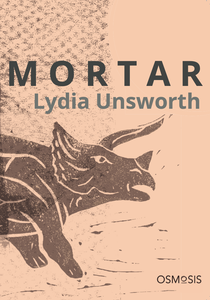 I was very excited to be given a review copy of Unsworth's new collection, since I'm a fan of her work. Thanks to Osmosis Press for letting me read it! From the start, this collection draws you into Unsworth's house - a contradictory place where it's both a place the writer wants to be and a 'chokehold'. The themes of home and the body were interwoven throughout this collection - with a sense of uncertainty and intimacy accompanying them. The home is given human-like characteristics: 'The skin of the window ready to pop', and 'The new couch...like some distended organ.' While the body is also something uncertain and sometimes uncomfortable: 'A lung smacks against a lung' and 'There is always a mouth where you didn't expect a mouth to be.' Aside from home, there was also a strong theme of a nature, especially nature in contrast with the urban. In Going to Seed for example, Unsworth says, 'like baby turtles that take to feet / under lamplight, too far from a sea / they will never now find.' This line portrays the sense of disorientation Unsworth appears to feel at all times - stuck between the enticement and power of nature and the artificial but oddly comforting constructed world of the city. It is something we all feel as humans - the disconnect with the natural world but also an affinity to our fabricated homes. Unsworth writes, 'I am the cobbles. Mortar. Mortar.' Throughout, I felt like her words were imprinting on me, as the world around us imprints on us. As Unsworth plays with words, images, feelings and expectations, she summarises it perfectly when she says, 'nothing is at rest.' Every page of this is a new pathway, leading us somewhere totally unknown, a labyrinth of things we thought we knew but in the end, we find ourselves seeing them in a new light or finding something different underneath. I recommend checking this out for yourself. You can grab yourself a copy at Osmosis Press Lydia Unsworth has published three collections of poetry: Mortar (Osmosis Press, 2021), Certain Manoeuvres (KFS Press, 2018) and Nostalgia for Bodies (2018 Erbacce Poetry Prize), and two pamphlets. Her latest pamphlet YIELD (KFS) and her debut novel Distant Hills (Atlatl Press) came out in 2020. Recent work can be found in Ambit, SPAM, Bath Magg, Blackbox Manifold, and The Interpreter’s House. 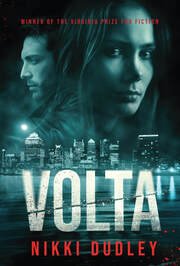 A lot of people have been asking me about themes in my work, especially for some podcasts I have appeared on. It really got me thinking. One obvious thing I know I'm fascinated by is memory. I love how the brain can lie to you, hide things from you - and that line between what you know and what you don't know consciously, unconsciously, and even subconsciously. I also find head trauma and changes to memory as a result really interesting. I love books that really delve into this, such as 'Before I go to sleep' by SJ Watson. Also 'Regeneration' by Pat Barker, which is almost about remembering too much. Lastly, I love 'The Woman Before Me' by Ruth Dugdall. All of these books have elements about memory and trusting yourself (or not). While I was thinking about this though, I also started thinking about other themes. I realised that my two novels have some characters who are especially detached from their emotions. Two characters in particular have little understanding of consequence, or if they do, they have a limited response to it. I started thinking about why I am interested in this. A realisation hit me - I grew up with someone who would now been referred to as 'neurodiverse'. While at the time, they had no label and it wasn't until adulthood that they did. In contrast, I was always very emotional and often labelled 'too sensitive'. I remember it being upsetting then but now, I'm proud that I feel things so strongly. I think it makes it easier to write down emotions. So back to my point, I wonder if my interest in characters who have limited emotional capacity (for whatever reason) might be connected to my life experiences. So when I tell people I don't tend to write about people I know, that perhaps on some level, I actually have been! It came as a shock to me in some ways. I hadn't thought about it before but there were many times in my life growing up where I tried to understand this person, their reactions or lack of, the way they didn't process things like I did. And maybe, in some strange way, this has snuck into my writing through the back door. What themes are in your novels/poems? Are they things you're aware of? Maybe there's something in there that you didn't know you were exploring, much like me! You can listen to me speaking on the Writing for Wellness podcast You can also listen to me speaking on the Full House Lit Mag podcast (time - 31:51) Q: Can you tell me a bit about yourself and your writing?
Wayward Voyage, based on real life pirate Anne Bonny, is my debut novel. I’ve always been a reader and I have a background in journalism, dance and theatre and love film. I first heard about pirates Anne Bonny and Mary Read more than twenty years ago and was fascinated by these women embodying ‘girl power’. I didn’t have the slightest ambition to write about them, but I wanted to find out more. This was before the first Pirates of the Caribbean film came out, there were few pirate books in print, and the internet was in its infancy. I first wrote Wayward Voyage as a screenplay but getting screenplays read, never mind produced, is a long shot. Years later I returned to the story and wondered if I had it in me to write a novel. I love world building, with character and plot led stories. And I love research. I revisited many books (political history, social history, sailing in the age of sail). I returned to the National Archives at Kew, South London, to access historical documents and letters from Woodes Rogers who was Governor of The Bahama’s at this period. Snippets of what he actually wrote made their way into my book. It was at the archives that I first handled an original copy of the 1720’s pirates’ trial in Jamaica. But research wasn’t all about reading. Years ago, I signed on as voyage crew on the Lord Nelson, a tall ship owned by the Jubilee Sailing Trust. That week sailing in the Canary Islands learning to handle ropes and going aloft to take in or drop sails will stick in my mind forever. You are in a world of your own out there. I recall my wobbly legs going aloft for the first time and inching tentatively along the lower yardarm. By the end of the week, I had ventured to furthest reaches of the higher yard. I make use of this experience describing Anne’s first time aloft. In summer of 2019 I visited South Carolina to walk in the steps of Anne Bonny and visited plantations to get a feel for life in colonial America (though these plantation houses date from a much later period). Q: Which book/s have you read at least 3 times? These come to mind... a real mix: To Kill A Mocking Bird; A prayer for Owen Meany; Pride and Prejudice; Middlemarch; Anne of Green Gables. Q: Is there a writer you would love to meet? Who and why? John Irving. Before I started writing I would think to myself “if I were ever to write I would love to write like he does”. Plot, character, finding that sweet spot between literary and commercial appeal. I wish! Q: What’s your least favourite part of the writing process? I guess starting a new scene is difficult. That moment of sitting before a blank sheet. You are getting to know your characters but you don’t yet know them intimately. You are getting to feel your way through your story, but its still blurry. But quite honestly, I love it all! Q: How would you describe your writing style? Are you a plotter or a pantser? Do you write everyday or whenever the moment strikes you? I’m a planner. Originally, when Wayward Voyage was a screenplay, I wrote scenes on file cards and storyboarded them across my floor, then I worked systematically through them card by card. Later, writing and rewriting my novel I found it useful to create a spreadsheet with scene-by-scene analysis. (What is the scene about? Does it take the story forward? Does it need changing/moving/deleting?) That document ended up more than 50 pages but was a useful tool. I have used a similar approach with next books. I have a morning routine. Yoga for an hour; breakfast; desk/computer. Since I started writing, I have lived in different houses but always had my own writing room. Where we live now, in south west London, I’ve set up a desk in our bedroom, so this is a dual-purpose space. It is light, overlooking the back garden, and I spend far too many hours here! Most weekdays I am at my desk any time from 9 and, mid-morning coffee break aside, work through to about 1 pm. Afternoons I may research, do other related activities read other books and make time to go for a walk. Q: What advice would you give a new writer? Don’t give up. If one route doesn’t work out, try another. Celebrate finishing your first draft, take a break, then re-write. Again. Again. And, don’t leap to accept a publishing offer. Take your time and do your research. A decade ago, I made a documentary film about older flamenco dancers in the UK. Just like with the story of Anne and Mary, I first touted my flamenco idea to various TV commissioning companies I knew but was told it wasn’t interesting enough for a broad audience. I took stock. I knew loads about dance and flamenco; knew how to put a story together; had experience as a producer, so figured I could learn the other bits. I met up with a documentary film student and – hey – we had a team. I made my low budget documentary and have never regretted it. The old dancers are passing and the Soho of post-war London is passing but I have captured a valuable social and cultural record of this period. The film was shown at a film festival and is now shared freely on YouTube. I guess money doesn’t matter so much but doing things I love matters mightily. It was the same with dance when I was younger. So how does this sum up?
Q: What inspires you? Multi-layered stories in film and book. Uplifting and informative documentaries and biographies. I’ve just finished reading In Order to Live by Yeonmi Park about her escape from North Korea. And learning. I want to continue learning throughout my life. Q: Tell us about your latest work. My next novel, Blind Eye, an environmental thriller, is about illegal logging from tropical rainforests and government collusion. This will come out in autumn. My partner is a founder member of the Forest Stewardship Council (FSC) so through him I reached out to a lot of specialists for advice. This also started out as a screenplay 15 years ago and I recently updated it and reworked. My film version was awarded joint first prize in the 2020 Green Stories Screenplay Competition. Q: Where can we find out more about you and/or your book? https://www.annamholmes.com Links to retailers. Info about myself. Information for Books Clubs, including quick research links and a PDF to download with topics and questions. I invite readers to up for a monthly newsletter where I can delve into a topic, relevant to my writing, that interests me: https://www.annamholmes.com/newsletter https://www.facebook.com/AnnaMHolmesWriter https://twitter.com/AnnaMHolmes_ Just starting started. Help me grow my community. 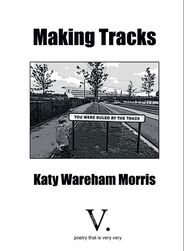 This collection is a fragmented history of the poet's own father and the MG Rover car site in Longbridge, Birmingham. From the beginning there's a foreboding of bad times with the visual poem Identity, which borrows lines from redevelopment plans for the site and reinforces the tragedy of these formal documents with a 'history' column. The poem ends with, 'Is this the right QR code for hidden history?' Thus, emphasising how her family's and others' histories were completely forgotten when it came to the decision that was made to close the factory. Throughout, we hear Wareham Morris' father's voice in personal snippets that seem to be from his perspective, talking about his reluctant decision to take the job, falling into a role that ultimately became who he was, only for it to be erased by a decision made by a removed entity. This is almost the worst sadness - that her father eventually slotted in at the factory, only for his identity to be stripped away like the car parts featured in some of the poems. I loved the playing with spacing, word weight and form in places. Some pieces felt like diagrams or instruction manuals, which added to the context of the pieces. In making a kind of instruction manual, this collection almost feels like a way for those betrayed by the closure (and their families), to begin to understand who they are and what they can be in the new roles they have been forced to adopt. Some poems are an onslaught of words and images upon words and images, much like a production line that's hard to stop, again mirroring the factory and the workers who in one poem, become lines and lines of 'ants ants ants' marching out of the factory. In her poem, Metro, she highlights the pressure of the workers: ‘Chaps collapsed on the track having heart attacks, had to get men working on the track next to the ambulance just to keep it going and another one whizzzzzzing.’ What struck me also was how the production line was seemingly relentless but Wareham Morris punctuated these stories with emotion and humanity. This collection is a fragmented and pensive exploration of a community betrayed, which is drawn together by the relationship between father and daughter. The mechanisms of the factory are ever-present in the words that slowly falter to an indeterminate stop with the final lines, ‘it had an end and we / alive, in reality / matching your - / some kind of / can hitch our memory’. There are gaps left to the readers in these lines, as though there’s a danger that information will be lost forever but there’s also a suggestion that even though the factory is closed, it feels as though the memories of the time are still very much present in the minds of those who have a connection to the site. I enjoyed seeing Wareham Morris play with words, presentation and spacing in this collection. What’s also great is when there’s a clear backbone to a collection, which was obvious from the title, ‘Making Tracks’, which was a reoccurring theme throughout. I will be seeking out more writing by Wareham Morris, and personally, it’s nice to see other mums producing experimental writing! To read more and buy Making Tracks, please visit: http://vpresspoetry.blogspot.com/p/bookshop.html Follow Katy on Twitter: @katy_wm 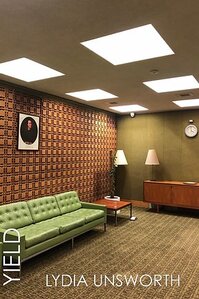 Lydia Unsworth's chapbook, Yield, is described as 'mashed together', 'a call-and-response with the Tao Te Ching' and 'a stretch back and forth between, across, and within the texts' written over a period of one month. To me, they felt like streams of consciousness at times, arguments and counter-arguments, whilst also exploring and redefining meaning. There was a strong call of nature in the pieces, especially in relation to how humans interact with it. For instance, I loved lines such as, 'I want to trample over 7000 hectares of your crops, take what I need,' and 'When I die, leave me in a sun-roofed sinkhole, fondue to your foundations.' The poems are full of need, fervent passion and melancholy. Nature is sometimes 'Up to no good,' or wistful through the eyes of art: 'Stars like gasps of not.' I loved the deep embedded feel of nature amidst the strange pull to city life, and a constant cycle of being drawn back to nature in one way or another: 'Take me to a field of weeds, so that I, too, can untether.' Relationships were also closely linked with the natural world, mirroring its unyielding power. For instance, in Therefore, Look, she writes, 'Come on, let us foot it out of here together, real as crops, tall grass in our eyes and sails.' There are also darker images linked with the earth and water: 'Drown me in your middle-ground, and, 'I grasp the formless form, that is, the gulf (gulp), that lies (dare I?) between us, and what I want is thick and fast and full of guts and lust and anything congealed enough to be called stuff.' This last line is almost medical and embedded, which brings me onto another thread in Yield: motherhood. Thoughts on what it means to be a mother seem peppered throughout this pamphlet. From discussing a child in relation to 'Raw leaves... all worryingly wild,' to how Unsworth is 'mud and gory splattered' but gathers up 'her offspring.' In these parts, the very real and difficult aspects of parenting seem to be emphasized. I also felt at points that some of it was a mother talking to her child, almost like a fable on life in poetry form, which gave Yield a tender thread. The form of writing and Unsworth's style also gave way to the examination of meaning and words. A big concern was focused on being misinterpreted, either intentionally using absurdity and humour, or misunderstood due to others’ interpretations. For example, 'I said it... but I did not say it well,' in relation to legislation, alluding to the mistakes that can be made by those taking your words in the wrong way. Unsworth even offers a summary of herself in one poem: 'I am just a girl who says what she feels, who picks up indiscriminate after-objects on the beach, who still turns her head a touch too quickly if somebody calls her (a) name.' Amidst all the jarring and fantastic images, the art and nature, the comments on everyday life, one of my favourite lines is, 'Shine a line in every corner of my heart,' which was simple but I think a good reflection of these poems. Underneath and in-between all the words, even the absurd commentary, was a strong sense of heart binding it all together. To read more and buy a copy of Yield, visit the KFS website Follow Lydia on Twitter: @lydiowanie |
Short reviews of books I've enjoyed and author interviews Archives
January 2022
Categories |
Member of the Society of Authors
Copyright © 2019 onwards · All Rights Reserved · Nikki Dudley
Proudly powered by Weebly
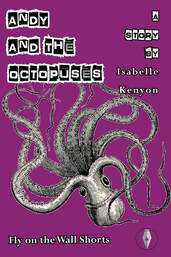
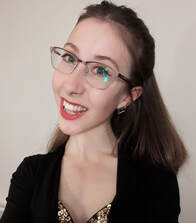
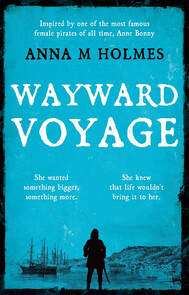
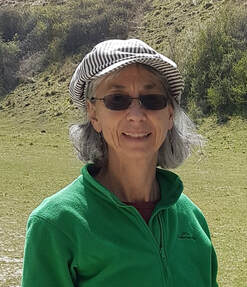
 RSS Feed
RSS Feed